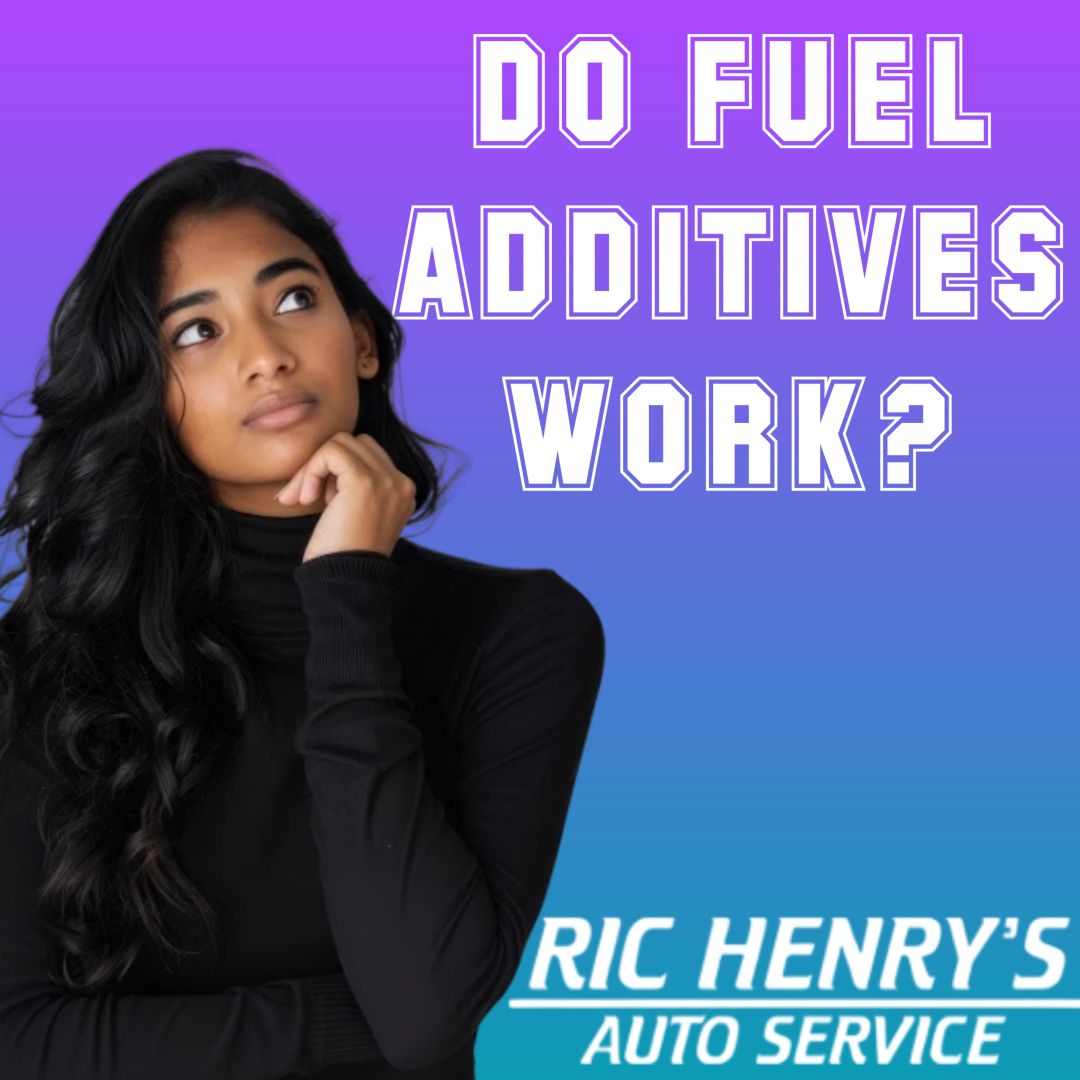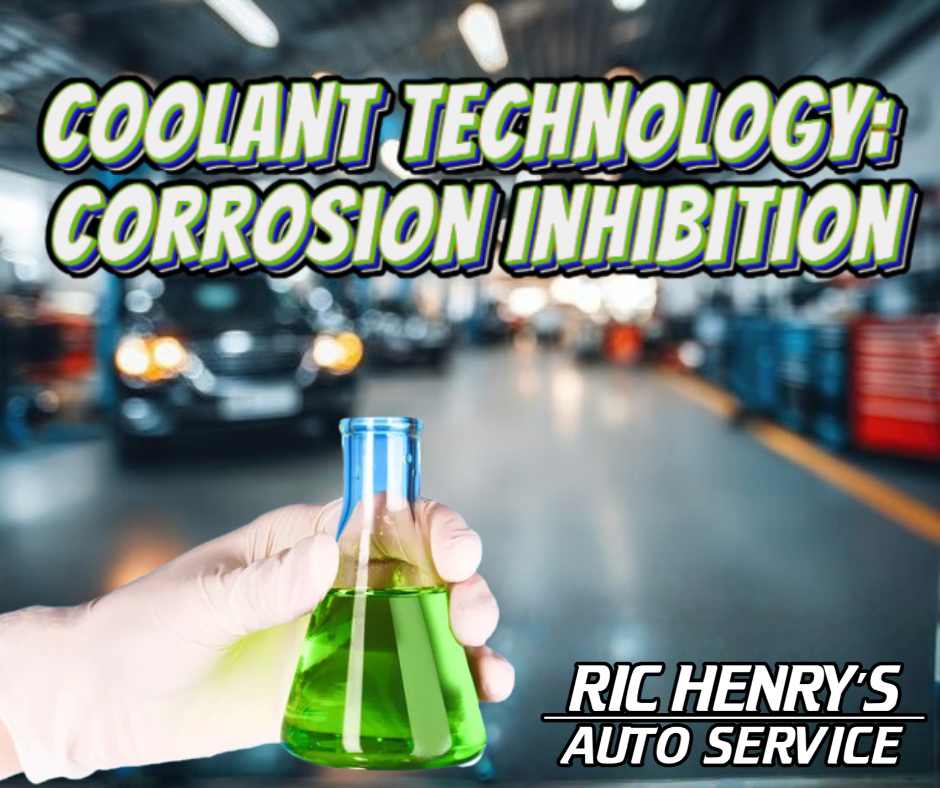The Truth About Fuel Additives
NaTasha Brand • August 25, 2025
Miracle in a Bottle or Highway Robbery?

You’re standing in the auto parts aisle, staring at a dizzying array of potions and elixirs that promise to clean your engine, boost your MPG, and restore lost horsepower. In the scorching San Angelo heat, where dust and heat work overtime to gunk up your engine, the promise of a quick fix is tempting. But do these fuel additives actually work, or are you just pouring money into your gas tank?
At Ric Henry’s Auto Service, we’ve seen the good, the bad, and the ugly when it comes to these bottled solutions. Let’s pop the hood and separate the fact from the fiction.
What Are Fuel Additives, Anyway?
In short, they are chemical compounds designed to be added to your fuel to alter its properties. They’ve been around since the dawn of the internal combustion engine. The key is understanding that not all additives are created equal. They generally fall into a few categories:
• Fuel Injector Cleaners: The most common type. They contain detergents meant to dissolve carbon deposits on injectors, intake valves, and combustion chambers.
• Octane Boosters: Claim to increase the fuel’s octane rating, which can help prevent knocking in high-performance engines (but do very little for your average sedan).
• Fuel Stabilizers: Designed to prevent fuel from degrading over time, crucial for lawn equipment or vehicles that sit for months.
• Water Removers (Drying Agents): Aim to absorb small amounts of water contamination in your gas tank, a rare but potential issue.
The Good: When Additives Actually Work
Let’s be fair, some additives have their place. Top-Tier gasoline, which is sold at most major brand stations, already contains a robust package of detergents that meet a higher standard for keeping your engine clean. For the average driver using quality gas, an additive is often redundant.
However, there are scenarios where a good quality cleaner can be beneficial:
• High-Mileage Vehicles: Engines with 75,000+ miles may have significant carbon buildup that standard fuel can’t handle.
• Performance Issues: If you’re noticing a slight rough idle or a small drop in fuel economy, a cleaner might help.
• Preventative Maintenance: Used sparingly (e.g., once every 10,000 miles), they can help prevent major deposits from forming.
The Bad & The Ugly: The Truth About “Magic in a Bottle”
This is where we get to the heart of the matter. For every legitimate product, there are a dozen making outrageous claims.
• The MPG Myth: Be highly skeptical of any product promising dramatic fuel economy gains. Physics and your car’s engineering are the main factors in MPG, not a $20 bottle.
• The “Restore Power” Fantasy: If your engine has lost significant power due to mechanical wear (like worn piston rings or a failing catalytic converter), no additive will bring it back. That requires physical repair.
• The Risk of Damage: Some cheap, aggressive additives can dislodge large chunks of carbon all at once, which can then clog catalytic converters or fuel filters, leading to very expensive repairs.
The San Angelo Angle: Heat, Dust, and Your Engine
Our local conditions are tough on cars. Extreme heat can cause fuel to vaporize differently and make engines more prone to knocking. Our dust can find its way into places it shouldn’t. While a quality additive might help with specific cleaning tasks, it’s no substitute for the real preventative maintenance we specialize in at Ric Henry’s: regular air filter changes, fuel system services, and using the right quality fluids for our climate.
Why Professional Service Beats a Bottle Every Time
Think of it this way: a fuel additive is like using mouthwash. It can provide a fresh feeling, but it’s no substitute for a professional cleaning by a dentist.
At Ric Henry’s Auto Service, when you come to us with a rough idle or loss of power, we don’t guess. We:
1. Hook up advanced diagnostics to read real-time data from your engine.
2. Perform a fuel system cleaning using professional-grade equipment that directly cleans the injectors and intake, far more effectively than any pour-in solution.
3. Back all our work with a 3-year/36,000-mile warranty, something no bottle of additive can offer.
We fix the root cause, not just mask symptoms.
So, do fuel additives work? The answer is: sometimes, for specific, minor issues. They are a Band-Aid, not a cure. For a lasting solution and real peace of mind, trust the professionals who know your car inside and out.
Save your money on magical potions and invest in proven care.


Let’s talk about the most misunderstood fluid in your vehicle. No, not the blinker fluid (though we’ve heard that one). It’s your coolant. That vibrant liquid sloshing in your radiator isn’t just “anti-freeze.” It’s a meticulously engineered chemical cocktail, a modern marvel of corrosion inhibition tasked with a Herculean job: protecting your engine’s metallic innards from turning into a costly pile of rust and scale, all while battling the brutal Texas heat. Gone are the days of a simple green ethylene glycol mix. Today’s coolants are a saga of chemistry, and the heroes of this story are corrosion inhibitors: Silicates, Phosphates, and Organic Acids (OAT). Think of them as your engine’s personal anti-rust security detail. The Cast of Chemical Characters: Silicates: The rapid-response team. These compounds form a near-instant, thin protective film on aluminum surfaces. Critical for protecting modern aluminum heads and radiator tanks from corrosive pitting. They’re fast but can be a bit overzealous, sometimes depleting quickly or forming gel-like deposits if not balanced correctly. Phosphates: The foundation builders. Excellent for protecting iron and steel components (think block liners, water pump sleeves). They create a stable protective layer. However, in water with high mineral content (hard water, which we certainly see in West Texas), they can precipitate out and form scale—akin to radiator kidney stones. Organic Acids (OAT): The long-term strategists. Developed for extended-life formulas, OAT compounds work differently. They don’t coat everything preemptively; instead, they remain in solution and only spring into action at sites of actual corrosion, neutralizing the attack. This allows for longer service intervals but requires different metallurgy to be fully effective. The Evolution: From One-Size-Fits-All to a Tailored Suit. The history of coolant is an arms race against corrosion. Early formulas were often silicate and phosphate-heavy. Then, as aluminum became king and global manufacturers sought longer drain intervals, technology splintered. You got OAT-based coolants (common in GM, some Fords), Phosphate-Hybrid OAT (often Honda, Toyota), and Silicate-Hybrid OAT (many Fords, Chrysler, and European specs). The critical takeaway? Your modern vehicle’s cooling system is designed for a specific type of coolant chemistry. Using the wrong one, like pouring an Asian-specific formula into a European car, or vice-versa—can lead to inadequate protection or harmful deposits. It’s not just about color; it’s about the recipe. Symptoms to Watch For: Your Coolant’s Cry for Help In the San Angelo heat, your cooling system works overtime. Stay vigilant for: Discolored Coolant: It should be bright and clear (green, orange, yellow, red, blue). If it’s murky brown, rusty, or has an oily sheen, the inhibitors are exhausted or contamination is present. Visible Sediment or Scale: Grit in the radiator neck or reservoir is a major red flag. Overheating: Often the final act of a system hampered by internal scale or clogged passages. Frequent Low Coolant Levels: (With no visible external leak) Could point to internal corrosion eating away at gaskets or components. Why This Demands a Shop That Evolved with the Science (Like Ours) You can’t properly service a 2020s computer-on-wheels with 1990s knowledge. Coolant service is no longer a “drain and fill.” It requires: 1. Knowledge of the precise OEM specification for your make, model, and year. 2. The Right Tools & Chemistry: We use the same professional-grade diagnostic tools, flush equipment, and approved chemicals the dealerships do. 3. Expertise to correctly diagnose if corrosion has already begun its silent work. At Ric Henry's Auto Service in San Angelo, we’ve evolved right alongside these fluid technologies. Our experienced technicians don’t just change coolant; we perform a comprehensive cooling system service: inspection, testing, correct fluid selection, and a proper exchange. We handle everything from minor fixes to major overhauls, backing all our work with a strong 3-year/36,000-mile warranty for your peace of mind. So, trust the chemical guardians in your coolant. And when it’s time for service, trust your car to the experienced hands at Ric Henry’s Auto Service. After all, in the battle against West Texas heat and metallic decay, you want a pit crew that speaks fluent chemistry.




Share On: